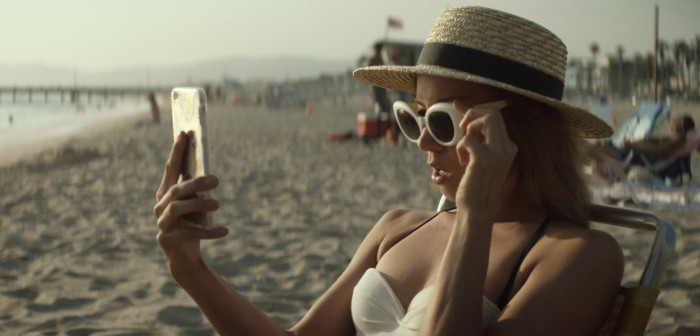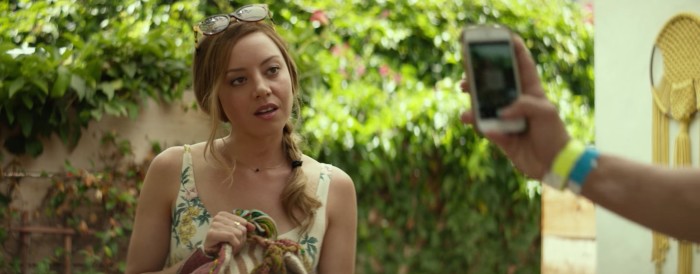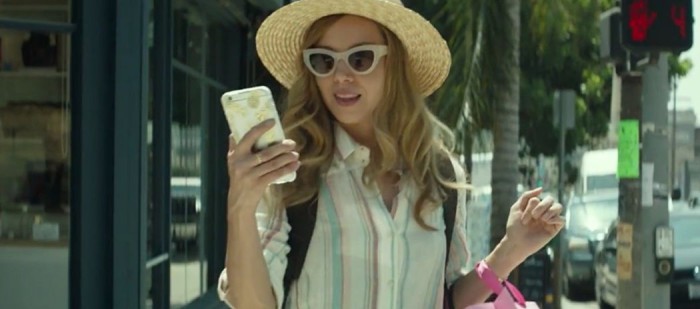'Ingrid Goes West' Is The Best Movie Ever Made About The Internet (And Our Obsession With It)
The opening joke of Ingrid Goes West is a much about desire as it is disappointment and the inextricable nature of class in how it informs what we want, how we want, and how we get it.
It's deceptively simple: the audience is left with little else but a sandy beach, the deep blue sea, and the sound of whatever generic paradise can offer. Perhaps it's comfort or the alleviation of whatever weight presses down. The waves crawl back and forth on the shore, never encroaching. The line across the sand is diagonal, and the beach looks as if it stretches into eternity, without a blemish or a flaw. This is perfect. No, this is perfection. The iconography of its landscape speaks for itself, that heaven could be a place on earth, dominated by kind of serenity that looks just like this: fun in the sun, the cleanest water, pamphlet perfect. The details, though, become fuzzier. It even becomes brighter for an elusive moment, and then it's gone, as if to suggest that maybe we're looking at a screensaver. Its bright teal and yellow colors, the overwhelming brightness of the sun begin to fade, or become flatter, even though the image itself remains the same. The title card flickers on and off without much consequence. The waves stop moving. The calls of seagulls cease. Colors look almost as if they've congealed, like paradise has been lost. What was once something with dimension, hyper tactility is revealed to be flat, dull, boring, insincere.
It's a motivational poster, hanging on the wall of a psychiatric clinic.
That's a bummer. It sucks. The cutesy saying, something about self-empowerment or getting in your own way, just makes it worse, maybe it makes it hurt more. And that it transformed from something possible to something with artificiality to another thing without potential in it is more heartbreaking. That this tropical dream is just a lie wrapped in the facsimile of happiness brings to mind the way we conceive of happiness and pleasure. What else could one want than access to something that straddles the bizarre line of attainable and impossible? Advertisements for beach resorts are overwhelmingly demographically homogenous, but they've been replaced by a quasi-amateur mode of PR: the social media influencer. Which leads us to Aubrey Plaza and Ingrid Goes West.
Matt Spicer's film is built around Ingrid (Plaza), a mentally ill young woman who is committed after the death of her mother...and after she assaults an Instagram celebrity. Little background is given to Ingrid's relationship to her mother, but it's presumed that she would have been prone to becoming attached to social media and that the death of her mother exacerbated this. After being released from the institution, having weaned herself off of social media, she jumps right back in, with a new, obscure object of desire: Taylor Sloane (Elisabeth Olsen), whose ascent into Insta-fame is as mysterious as, well, anyone's. But she's beautiful, and blonde, and wealthy, and she, like the social media influences before her, records every aspect of her life in perfectly consumable, expertly composed bites. Ingrid finds her in a lifestyle magazine spread, and that's exactly what Taylor is selling for Ingrid to buy: a lifestyle. A life.
Ingrid, with the money left to her by her mother (in cash, no less), relocates to the west coast to befriend Taylor IRL, as the kids say, through various scheming. But even in person, as Ingrid's stalking transitions into what could be read as a friendship, there's ever the air of dissatisfaction on their faces, like both Ingrid and Taylor are searching for something that isn't there, performing for an audience that is too big for either to really connect.
Spicer's aesthetic is hinged upon replicating not only the look, but the adrenaline-like feel of looking through Instagram. And that's explicit. It's not a distracting made-up photo based social media platform, it is Instagram. Hashtags pop up, filling the screen; typed out inspirational phrases and Joan Didion quotes; and the actual feeds captured, hearts bouncing to indicate that a post has been liked by Ingrid, are a dream. Each post is like a spark,or a doorway into a fantasy. They're the hard work of someone who's curated their life to be without flaw or struggle beyond the flawless kind of struggle. There's fastidiously placed food and precisely color balanced selfies, every shot a dream.
However, for Ingrid Goes West to call these posts shallow or dumb would be too easy and would derail the film into being nothing more than a feature length piece of alarmist, old person screed. Yes, social media can be toxic. But few works, like the Black Mirror episode from season three, "Nosedive," are able to capture just how hypnotic looking into someone's life can be. How it can make you want to live something or release a part of yourself that you thought you'd been hiding.
What I Want
Ingrid has cash, and that may be about it. The friends and acquaintances that were once a part of her life now gawk at her and talk behind her back when they see her in public. (She, in turn, keys their car.) She has nothing to lose, so she takes her inheritance to California, where she will, again, have little to lose. Her landlord, Dan (O'Shea Jackson Jr.), is nice, but he's not hers and she's not his. Maybe there's potential; Dan is goofy, warm, and his passion for Batman is (explicitly, unsubtly) the most honest thing about him.
Ingrid's relationship with Taylor, and her husband Ezra (Wyatt Russell), is predicated on want. Taylor's relationship with everyone, in person or online, is predicated on want. Her photos, her house, what she eats, buys, reads, sleeps, drinks, does. It's about want. She makes people want her, want her life, want her body, want her. And Ingrid wants her life, wants her life, wants her body (she even dyes her hair), wants her. It occupies a grey area where the desire is not exactly sexual, but feels queer nonetheless. It's reminiscent of something like Ingmar Bergman's Persona or even Noah Baumbach and Greta Gerwig's Mistress America, where they are, consciously aware of it or not, mirror images of one another, something and someone to project onto. Taylor is everything Ingrid wants to be, and Ingrid is everything Taylor probably once was but now looks down upon. There's still the residue there.
But as their relationship intensifies, with Ingrid and Taylor spending days together, falling asleep next to one another, or even the intimacy that develops between Ingrid and Dan, Spicer leaves us with the impression that what Ingrid (and the others) wants most of all is something to lose.
How I Want It
The biggest asset to Spicer's film, the thing that keeps it from becoming another moralistic film about the internet, is the specificity of its world and characters. It's therefore incredibly important to make explicit what Taylor is and why she appeals to people. She isn't just someone famous on the internet, but someone whose self-proclaimed job is to document and sell her life on the internet. While at dinner in Taylor and Ezra's house, Ingrid asks what Taylor does. She states matter of factly that companies pay her to take pictures of products, labeling herself as a photographer (which is not necessarily incorrect). That's her Instagram feed. She is selling an identity.
Spicer fills his screen with hashtags, photos, this world Taylor has created, artisanal and without imperfection. She suggests Ingrid mimic her, as Ingrid weren't interested already, and the small apartment that Ingrid has is transformed into a living version of what Taylor is selling. She buys the same books, the same products. In one store, Taylor looks at a wind chime and suggests that it's totally for Ingrid. Ingrid looks at the price tag and it rings in at over $300.
Taylor whispers a secret to Ingrid about turning a little house into a bed and breakfast, a hipster-created nightmare. She tells the same secret to someone else. Taylor's relationships are, most of all, transactions. Either for opportunity or money, but most of all validation. She's just as guilty of wanting to be wanted as Ingrid is, but Taylor filters it through the decadence of bourgeois aestheticism.
Who I Am
Matt Spicer has ultimately created a world that's deeply cynical, that the crafting of identity is for protection and based on ulterior motive. Even if he posits Dan as the most honest character refusing to hide behind the mask of social media, he neglects to consider the ways in which his obsession with Batman is its own form of persona building. Even at the film's climax, Spicer seems to imply that little good can come from being on the internet because of how it reveals our deepest desires and our inability to attain them without compromising some part of ourselves.
It isn't that Ingrid Goes West isn't alarmist – the film straddles a line of alarm and bewilderment – but that it gives Ingrid a wholeness of character psychology. She's broken and fragmented and she takes comfort in a little world on her screen that seems at first easily manageable, quickly addictive. To cope with trauma is to ignore it altogether and fashion, for yourself, a new identity.
Ingrid Goes West has an emotional center to it which is buried beneath the film's hyper specific aesthetic identity: it's a film about people that want to be wanted and want to want. That part above where Ingrid wants something to lose is true: she has that and she loses it and it's the most human she may have felt in the whole film, that there were stakes to her friendship. When she loses that, Ingrid inches closer to finding who she wants to be outside the context of social media dependency. When she wakes up, she's almost there. She's almost herself, without filter. And then she picks up her phone again.




